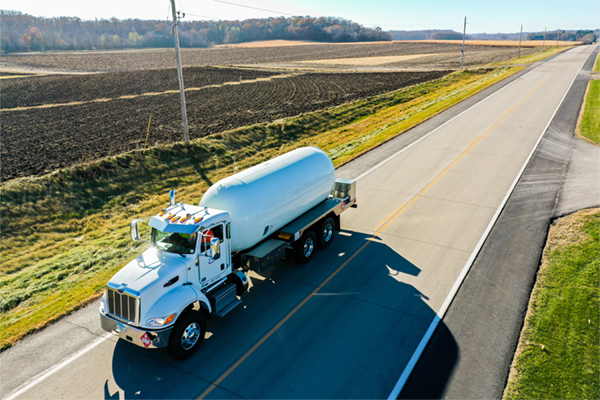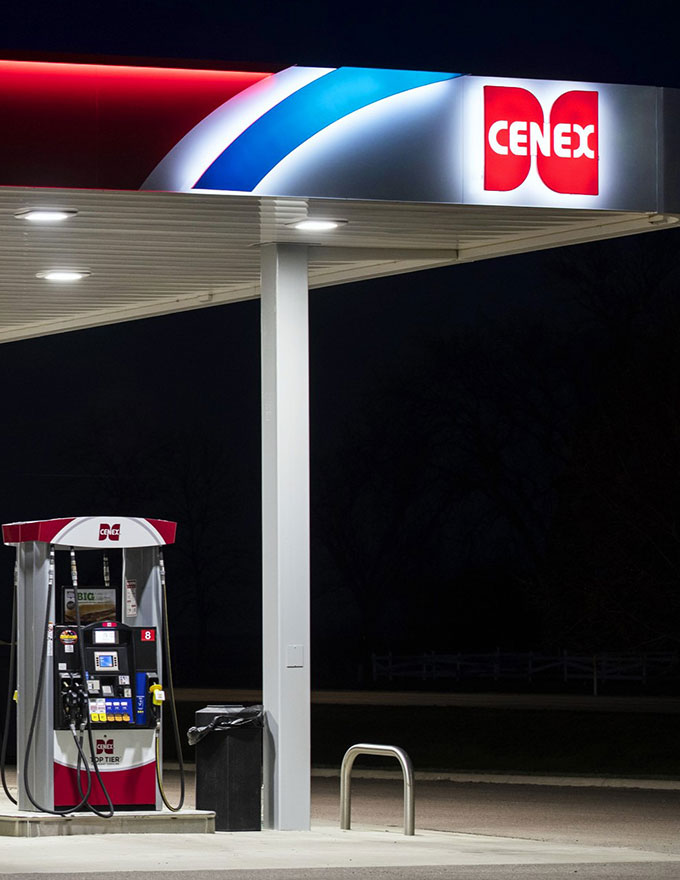Cenex® is
committed to propane safety excellence

Introduction to propane gas
Propane is a gas widely used to fuel appliances for heating, cooking and other use by more than 60 million Americans. Using this nontoxic energy source helps cut emissions and protect the environment. Propane is transported and stored as a liquid under high pressure in specially designed tanks or cylinders. Propane expands and contracts, depending on the temperature. When exposed to air, propane vaporizes into gas, eliminating the environmental dangers of contaminating soil and water.

When liquid propane changes into a gas vapor, it expands in volume by about 270 times. This means that propane is more economical to store and transport as a liquid rather than a gas vapor. However, this characteristic also means that even a small leak of liquid propane can result in a much larger quantity of vapor, which can be especially dangerous in a confined space.
Similar to any other flammable gas or liquid, propane is very safe when stored and handled properly. However, if propane is mishandled, it can cause property damage, injuries or even death. For this reason, users must have a thorough understanding of the properties and characteristics of propane, and the hazards and risks associated with its use.
Risks include:
- If propane comes in contact with your skin, it can cause frost burns.
- Concentrations of propane may cause flash fires or explosions.
- Propane vapor is heavier than air, and it may collect initially at floor levels or in other low areas before it begins to dissipate; to check for the presence of propane, carefully smell all over a room, especially in low spots.
- Even a slight gas odor may signal a serious propane gas leak, and you should take immediate action if you smell gas or suspect a leak.
- Improper use of propane appliances can produce carbon monoxide and result in carbon monoxide poisoning.
-
Propane is odorless and colorless in its natural state. However, because a propane leak can be a safety hazard, propane manufacturers add an odorant to help people detect propane leaks. All members of the household need to be able to distinguish the smell of odorized propane, which is often described as similar to rotten eggs, skunk spray or a dead animal. Ask your propane dealer for a free scratch-and-sniff brochure if you are not familiar with it.
Certain conditions may prevent a person from smelling the odorant, such as:
- Colds, allergies, congestion or other similar medical conditions.
- Use of tobacco, alcohol, prescription drugs or illegal narcotics.
- A decline in a person's sense of smell due to age or other physical conditions.
- Olfactory fatigue from being exposed to the odorant for an extended period.
- Strong odors overpowering the smell of the odorant.
- Leaking gas passing through the soil, reducing the smell of the odorant.
- Sleep – the odorant in propane may not awaken a sleeping person.
-
If you smell or suspect a propane leak:
- Do get everyone out of the home at a safe distance until a qualified professional has assessed the situation and indicated that it’s safe to return.
- Do attempt to shut off the valves at the tank if it is safe to do so.
- Do call both your propane supplier and the fire department for help from a telephone that is a safe distance from the house.
- Do not attempt to find the leak.
- Do not attempt to repair your appliance or light your pilot light.
- Do not turn light switches on or off inside the home.
- Do not use a telephone inside the house or in nearby areas.
- Do not light matches or smoke cigarettes anywhere inside or near the home.
-
To turn off the gas at the tank, open the lid of the tank to reveal the shut-off valve. Turn the valve to the right or clockwise to stop the flow of propane. If you have more than one tank, turn them all off the same way.
You should turn off the propane for the following reasons:
- If you smell gas or suspect a leak, you should turn off your tank as long as it’s safe to do so.
- After a storm or natural disaster, if your tank has changed position, taken damage or has broken, bent or disconnected gas lines, turn off the gas and call your propane retailer.
-
Whenever the gas has been turned off, national safety codes require that a qualified professional test your propane system before turning on the gas and relighting pilots. Call your propane retailer to learn more about when and how to turn off your propane system.
-
Propane gas detectors are available as an extra safety measure; however, they are only an aid and are not intended to reduce or eliminate proper safety procedures. When considering a propane gas detector, you should understand that:
- When a gas odor is detected, even if the gas detector alarm has not been activated, it’s still necessary to call for help.
- It is extremely important to follow the manufacturer’s instructions when installing a detector.
- When selecting a gas detector, you should only choose a detector that is listed with Underwriters Laboratories (UL).
-
The propane system at your home or business should only be installed, maintained and repaired by experienced personnel. Call a qualified service technician to light or relight pilot lights on your appliances. Best practices for properly maintaining your propane system and appliances include:
- Do not bleed gas lines into enclosed areas.
- Do not tamper with gas controls on your appliances.
- Do not use appliances that have been flooded or have become wet. The controls may be damaged and cause the safety feature built into the controls to malfunction and allow a dangerous propane leak.
- Do not let your propane system run out of propane. If it happens, turn off the gas valve on the tank or cylinder and call your propane dealer.
- Do have wet or flooded appliances and controls serviced immediately.
- Do have your propane system and all appliances periodically checked by a qualified service technician for proper operation and safety.
-
When a propane system runs out of fuel, pressure changes can cause joint compounds to contract and leak. If a valve or gas line is open when the propane runs out, a leak could occur when the system is recharged. Air and moisture can get into an empty or near-empty tank, weakening the tank. Rust also removes the odor from propane, making leak detection more difficult. While the homeowner is responsible for monitoring tank levels, some propane retailers offer automatic delivery services or tank monitors, which use advanced technology to monitor and track fuel use. If your tank runs out of propane, federal law requires an inspection by a propane technician. A qualified technician will check for leaks as untrained eyes might not recognize problems with the system.
-
Carbon monoxide is a toxic, odorless and invisible gas that can be created when any fuel is burned incompletely. Unburned propane doesn’t produce carbon monoxide. Propane that is properly burned, with the correct fuel-to-air ratio produces some carbon monoxide. Partially burned propane that has a poor fuel-to-air ratio produces a lot of carbon monoxide. All members of your household should know the following about propane and carbon monoxide:
- Not maintaining all your appliances can result in potentially fatal carbon monoxide poisoning.
- Improperly vented appliances can cause carbon monoxide poisoning.
- Never use propane-powered camping equipment, grills or portable heaters indoors or in confined spaces.
- Consider installing one or more carbon monoxide detectors inside your home or recreational vehicle. They sound an alarm when carbon monoxide is present.
- Symptoms of carbon monoxide poisoning may include one or more of the following: eye irritation, headaches, dizziness or sleepiness. You may also notice excessive moisture buildup on the inside of windows.
- If you identify any of these symptoms, immediately open doors and windows to ventilate the home and call a qualified service technician for help.
-
Follow these rules to safely transport and store propane cylinders:
- Use only DOT-approved cylinders that are in good condition.
- When using a new cylinder for the first time, insist that your propane dealer purge the cylinder to remove air and moisture in the tank.
- When transporting a cylinder, make sure it is secured and in the upright position.
- When filling cylinders attached to your vehicle, be sure all sources of ignition are shut off, including pilot lights and vehicle engines.
- Cylinders should only be filled to 80 percent of capacity.
- Never use propane from a cylinder without a regulator.
- Never store a cylinder indoors or in an enclosed vehicle.
- Do not use matches or a lighter to check for leaks.
- Never smoke or have open flames near propane cylinders.
- Never refill a single-use propane cylinder.
- Always have portable, refillable propane tanks refilled by a propane dealer.
- Never attempt to refill a portable (20-gallon) propane tank from your (100- to 1000-gallon) residential or business tank.
-
Although propane grills are considered safer than charcoal grills, they still pose a fire risk. Because propane-fueled appliances can be dangerous if improperly used, it’s important to comply with a few basic rules:
- Read the manufacturer's instructions before operating a gas appliance.
- Keep manuals nearby for easy reference.
- Never use propane grills or space heaters indoors or in any confined space.
- Before lighting a propane gas appliance, check all connections for tightness using a leak detection solution.
- Turn off grill or heater immediately after use.
- Tightly close valves on the cylinder when an appliance is not in use.
For more information, please see our Propane Safety Data Sheet.
Cenex propane safety reimbursement program

Find a store

